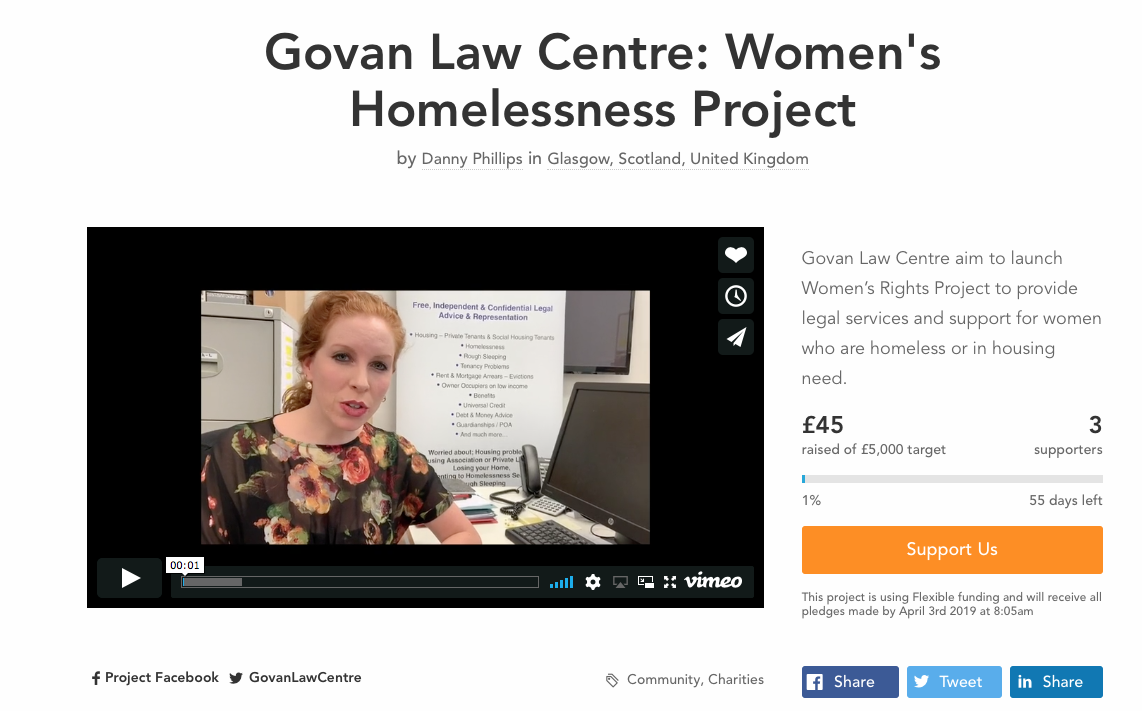Govan Law Centre (GLC) has welcomed the
Christie Commission’s emphasis on the need to prioritise preventative spending to tackle the root causes of social problems, and believes that if its innovative earlier prevention of homelessness systems were rolled out across Scotland, hundreds of millions of pounds of public money could be saved each year.
GLC’s prevention of homelessness senior coordinator, Alistair Sharp said: “At the moment our innovative earlier prevention of homelessness systems have a 84% success rate, resulting in a potential saving of £48m per annum if rolled out across the City of Glasgow – or potentially several hundreds of millions of pounds per annum if replicated across Scotland”.*
“We are further developing and progressing prevention and partnership through a new innovative process of early intervention with our partners. This will allow us to provide services at a much earlier stage to protect people in their tenancy’s and owner occupancy by providing legal advice and representation, money and benefits service and access to other targeted support from the voluntary sector and social work services teams.”
GLC's Principal Solicitor, Mike Dailly said: "Govan Law Centre would like to see an amendment to the Homelessness etc., (Scotland) Act 2003 to require all local authorities in Scotland to provide a co-ordinated earlier intervention prevention of homelessness system. We have seen the impact and success that such an approach can have in the Southside of Glasgow, and there is no reason that such an approach could not be delivered across Scotland".
The
Christie Commission reports that as much as 40% of all spending on public services is spent on social problems which could have been prevented in the first place and by ‘prioritising a preventative approach’ and developing ‘a radical, new collaborative culture’ with the public and voluntary and private sectors working in partnership could cut demand and ‘big bills’ in health, social care and justice.
Govan Law Centre’s Prevention of Homelessness Partnership is made up of Govan Law Centre, Money Matters Money Advice Centre and Glasgow South West Social Work Services and in 2010 won the Scottish Social Services Accolade for Partnership Working in Adult Social Care. The Prevention of Homelessness Partnership project has prevented over 2,000 people and their families from homelessness since it began in 2005. Successful in both creating a collaborative culture through its multi disciplinary/agency partnership approach and by making prevention paramount for homelessness prevention in Glasgow South West.
We have already proven the impact of cost reduction to the public purse as reported in an independent evaluation of the Prevention of Homelessness Partnership project (2009). By preventing over 2,000 people and their families from eviction, repossession and homelessness the cost savings to the public purse can be calculated in terms of: the estimated economic costs of eviction and of a typical homelessness case being £23,074, (it can be as high as £83,000 for the most complex case); the cost of each case to local authorities and the housing provider is £15,000. (SCSH briefing Tenancy Failure and How Much it Costs & Crisis: How Many How Much). This shows that massive cost savings are achievable.
*
Our estimate is based on our previous 84% success rate in preventing homelessness in relation to Glasgow City Council section 11 notification data (providing the number of cases taken to court for eviction and repossession in Glasgow – in 2010/11 (12 month period) there were 2,485 section 11 notices in Glasgow alone); utilising an average figure for the cost to the taxpayer for providing a range of housing, social work support and health service costs per household in the sum of £23,074 (COSLA Prevention of Homelessness Guidance, 2009).

Christie Commission Report: GLC says hundreds of millions of pounds could be saved by earlier, co-ordinated, intervention in homeless prevention
 GLC has settled a court action seeking a refund of a bank's legal expenses levied as the cost of their solicitors raising repossession proceedings against a Scottish homeowner. The action was raised in 2005, and the bulk of legal fees were charged over five years ago.
GLC has settled a court action seeking a refund of a bank's legal expenses levied as the cost of their solicitors raising repossession proceedings against a Scottish homeowner. The action was raised in 2005, and the bulk of legal fees were charged over five years ago.











































